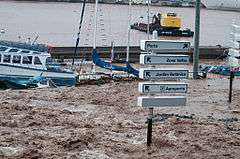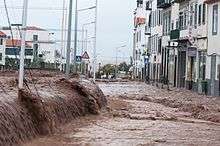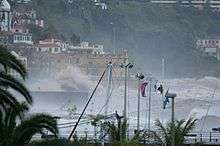2010 Madeira floods and mudslides
The 2010 Madeira floods and mudslides were the result of an extreme weather event that affected Madeira Island in Portugal's autonomous Madeira archipelago on 20 February 2010. At least 42 people died[1] and at least 100 were injured.[2] However, with at least eight people still missing, the final death toll is still uncertain.[1]
 | |
| Date | 20 February 2010 |
|---|---|
| Location | Madeira, Portugal |
| Deaths | at least 42 deaths and 100 injured |
| Property damage | unknown |


Causes
The rainfall was associated with an active cold front and an Atlantic low-pressure area that was over the Azores and moved northeastwards on 19 February 2010.[3]
This storm was one in a series of such storms that affected Spain, Portugal, Morocco and the Canary Islands with flooding, rain and high winds. These storms were bolstered by an unusually strong temperature contrast of the sea surface across the Atlantic Ocean. Abnormally warm waters had been widespread off West Africa whereas relatively cold surface waters had stretched between western Europe and the southeastern United States.[4]
The storm was exacerbated by the eruption cloud of the Soufrière Hills volcano.[5]
The floods and mudslides were the result of an extreme weather event that, in some places, dropped more than double the monthly average of rainfall in a very short period. Between 6 a.m. and 11 a.m. local time (and UTC), 108 mm (4¼ inches) of rain was recorded at Funchal weather station and 165 mm (6½ inches) of rain at the weather station on Pico do Arieiro.[3] The average rainfall in Funchal for the whole of February is 88.0 mm (3½ inches).[6]
Effects
Damage was confined to the south of the island.[7]
The city of Funchal was heavily damaged by landslides. In one instance, mud and water gushed down a city street over cars and buildings.[8] Communications were seriously disrupted across the island.[9][10][11]
Amid the destruction, the airport was closed, bridges were washed away, and one man saw his family swept off by the waters.[12][13][14] One hotel manager commented, "This was worse than the last really big storm in 1993. We have been told that three inches of rain fell in an hour. I saw a new BMW floating past the end of my street today."[15]
Emergency response
Portuguese Prime Minister José Sócrates said he was "absolutely saddened and shocked with the images, with the consequences of this calamity."[16] He promised the government would provide help to ensure Madeira could begin recovery work as quickly as possible.[17] Sócrates and Interior Minister Rui Pereira planned a flight to the island to examine and evaluate the damages and to coordinate aid efforts with the local autonomous government of Alberto João Jardim. Local government authorities made temporary shelters available for the homeless, estimated in the hundreds. The Portuguese military sent a naval frigate, containing medical equipment and a helicopter, to Madeira.[16] However, the Portuguese government declined to declare a state of emergency in the region, which would have made them eligible to obtain funds from the European Union, saying, “We don’t need anything from Brussels. We know exactly what we will do. We don’t need any help; we will solve our problems.”[18]
The UK Foreign and Commonwealth Office reported that five Britons sustained injuries, and one is missing.[19] As of 26 February, Portuguese official sources reported 42 dead and 8 missing, of whom only one was a tourist.[20]
Reconstruction and cleaning work started a few hours after the rainfall. On the same day, several dozen units of heavy machinery and trucks were seen in the streets of Funchal and other major affected sites, cleaning streets as well as rocks and mud accumulated in the "ribeiras". In the next few days this number peaked to several hundred heavy units and trucks operating in all affected sites. In spite of some access restrictions in the centre of Funchal and some other parts of the island, all services were soon fully functional and normal life was restored. No tourist resorts were affected by the event, except for a few small hotels inland where some blocked roads caused access restrictions. While full restoration of all affected infrastructure may take up to a few years and cost around €1.4 billion,[20] most of the island is fully functional.
Humanitarian response
In support of the flood victims, Real Madrid footballer and noted Madeiran Cristiano Ronaldo pledged to play in a charity match in Madeira, between the Portuguese Liga club Porto and players from Madeiran-based Portuguese Liga clubs C.S. Marítimo and Nacional.[21]
On 7 March 2010, the Mota-Engil group announced that it would make an investment of €1.2 million to build 10 houses for those who were made homeless as a result of the floods.[22]
References
- "Madeira: Número de mortos aumentou para 42", Público (in Portuguese), 26 February 2010, archived from the original on 1 October 2011
- "Sobe para 43 o número de mortos, já se contam mais de 100 feridos", Público (in Portuguese), 21 February 2010, archived from the original on 19 September 2011
- "Temporal no Arquipélago da Madeira", Instituto de Meteorologia, I.P. Portugal (in Portuguese), 20 February 2010, retrieved 22 February 2010
- More on Deadly Medeira Flashing Flooding, Accuweather.com, retrieved 22 February 2010
- Yim et al. in deWind (2010) "Volcanoes and storms." Geoscientist Vol. 20 No. 6, pages 11–12
- Weather station FUNCHAL/S.CATARINA Average Rainfall, worldclimate.com, retrieved 22 February 2010
- Britons in Madeira warned after deadly floods, BBC News, 21 February 2010
- "Dozens dead in Portuguese floods". Toronto Sun. 20 February 2010. Retrieved 20 February 2010.
- "Mau tempo na Madeira já provocou pelo menos 31 mortos". I Online. 20 February 2010.
- "Alberto João Jardim confirma 30 mortos na Madeira". Público (in Portuguese). 20 February 2010. Archived from the original on 24 September 2015. Retrieved 20 February 2010.
- "População sem água, electricidade e telefone está preocupada com a situação". Público (in Portuguese). 20 February 2010. Archived from the original on 23 February 2010. Retrieved 20 February 2010.
- "Over 30 reported dead in Madeira mudslides". Jersey Evening Post. 20 February 2010. Retrieved 20 February 2010.
- "Severe weather kills 32 in Madeira". Radio Netherlands Worldwide. 20 February 2010. Archived from the original on 23 February 2010. Retrieved 20 February 2010.
- "Deadly rains lash Portuguese island". Al Jazeera. 20 February 2010. Retrieved 20 February 2010.
- Colin Freeman and Nick Meo (20 February 2010). "At least 25 killed in Madeira storms". The Daily Telegraph. Retrieved 20 February 2010.
- Portugal rushes aid to Madeira after deadly floods, BBC News, 21 February 2010
- "Madeira floods: death toll rises to 40". The Guardian. 21 February 2010. Retrieved 11 March 2010.
- "February - Madeira floods". The Portugal News. 1 January 2011. Retrieved 19 February 2012.
- "Briton 'missing' in Madeira floods". BBC News. 21 February 2010. Retrieved 21 February 2010.
- "Prejuízos são de 1,4 mil milhões". Jornal da Madeira. 27 February 2010. Archived from the original on 26 July 2011. Retrieved 27 February 2010.
- "Ronaldo to play in charity match for Madeira". Reuters. 22 February 2010. Archived from the original on 22 February 2010. Retrieved 22 February 2010.
- "Mota-Engil constrói 10 moradias para desalojados da Madeira". Público (in Portuguese). 7 March 2010. Archived from the original on 1 October 2011. Retrieved 11 March 2010.
External links
| Wikimedia Commons has media related to 20 February 2010 floods and mudslides in Madeira. |